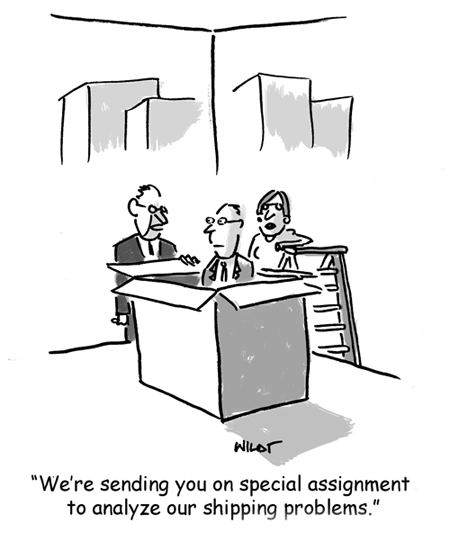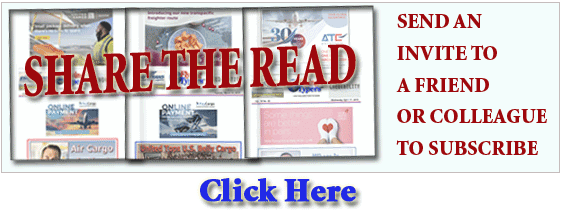
 |
| |
 |
 #INTHEAIREVERYWHERE |
| Vol. 21 No. 12 | Wednesday
March 16,
2022 |
| |
FIATA’s SG is Robert Keen, much more than a knowledgeable professional. Interviewing FIATA’s personalities is really a welcome task. Having served as DG until 2017, every second year I have this wonderful opportunity of identifying a new candidate. The October 2021 elections was a good time to reconnect with old friends and establish new contacts within the group. Robert Keen (known to all as Bob) surely has been a friend for many years now. We were both born in 1952. Coming out of very similar pipelines in life, as we shall learn in a short while, Bob and I were bound to meet sooner or later. When I asked Bob if he was available to speak with the FlyingTypers I was uncertain about the first significant contact Bob and I had had, and asked him. It was at the 2000 IATA Cargo Week in Vancouver. My memory went right back to the wonderfully organised meeting in the splendid Canadian city, and the unforgettable sushi in the restaurant in front of the venue, such a temptation! We were both delegates at the ICW on behalf of FIATA, but we had rarely met before. Sandro Consoli, then AFI Manager in FIATA, introduced us over a cup of coffee in the hall. My impression was that we both carefully selected what we wanted to take from Sandro’s expressions. Sandro was, and probably still is, somebody who will not go unnoticed. In the conversation that Bob and I entertained to prepare the interview, I also asked Bob questions to fill some of the missing links in his portrait. With his usually casual approach Bob notched up his remarkable achievements: he was born and brought up very close to London Heathrow Airport and has always lived nearby, “sometimes under a flight path”, as he puts it. At school he was predicted to go to university, but he was wondering whether those careers were not perhaps too far away in future and then he joined a construction firm. At eighteen he was successful already, but the family was putting pressure on him to “get a steady job”, as parents would say in those years. Living next to the airport, the job centre sent Bob to the cargo terminal as a messenger, with a meagre salary, compared to construction, but “family happy, everyone’s happy”. The messenger became an office junior, then a trainee clerk leading to import and export work and the usual career path of clerk, supervisor, department manager. In 1997 his boss was reading a trade newspaper and pointed at an advert, telling him: “there’s a good job here for someone . . . ” and the rest is history. The former messenger is now the much praised Director General of BIFA (www.bifa.org), who just landed on the tarmac of the FIATA Presidency as Secretary General. Let us rewind the tape to just why Bob and I were in Vancouver in 2000. After leaving BAX Global in 1997 Bob joined an industry owned freight software company (ASM), which had been started by BIFA, but had become an independent mutual. As BIFA’s AFI delegate with solid connections in freight software through ASM, Bob’s trajectory into the IATA Facilitation Panel in Vancouver on behalf of FIATA was on track. In the meantime, the full move to BIFA had taken place in 1999 and again we could say “the rest is history”, but please bear with some of the formal stuff: at BIFA Robert Keen covered all roles before becoming DG. In FIATA his first role was the UK Air Freight Institute (AFI) delegate and then the Customs and Facilitation Institute (CAI), eventually acting as Chair of the Advisory Body Information Technology (ABIT) for a short time. Bob was asked to join WG Sea when the Rotterdam Rules was a hot topic, as he had represented BIFA to the UK Government and was clearly an expert on the subject. Frank Boogerts proposed that Bob succeed him as Chair of the WG Sea when he retired and the same happened when Chris Gillespie stood down from the Multimodal Transport Institute (MTI). The FIATA General Meeting endorsed these nominations without hesitation and the same happened as Robert Keen was elected as Secretary General at the end of 2021. The reasons for me attending the event in Vancouver were less straightforward, but I can summarise by saying that I was a hyperactive Italian delegate who took an interest in anything legal and electronic… Again the rest is history, as Bob puts it. And here is Bob in his own words: FT: Bob, you have long yarn within FIATA, with many different responsibilities on your shoulders at different times. As FIATA’s Secretary General, the most institutional position of all, you are now in charge of rules and procedures. How does this blend with your previous positions: WG Sea and MTI, which were as operational as it can possibly be in an association? RK: All of my career I have worked in multiple disciplines rather than being a specialist in one topic. This has given me a broad knowledge and the ability to undertake differing roles so the switch from running the Multimodal Transport Institute to the Secretary General role should be relatively smooth. At BIFA, the Secretary General role (UK equivalent Company Secretary) is part of the Director General role, so I have been familiar with the management of a Board, including accounting and fiduciary duties for some years. This should assist me in the FIATA role. FT: Under Bob Voltmann we have seen eventually FIATA move from Zurich to Geneva as well as a number of smaller changes. Do you think there will be many other changes in the pipeline or do you think the period ahead will be ideal for reaping the results of these changes? RK: Due to the impacts of the Covid-19 pandemic, FIATA is still in a period of transition. The DG has put all necessary structures in place in Geneva as part of a reset programme. The aims and goals of FIATA are still fulfilled thanks to the work of the Institutes, working groups and advisory bodies, but nothing can replace the engagement and momentum born out of personal contacts. FT: The 2022 FIATA Headquarters meeting will probably remind us a bit more of the event we all used to know, as it will be the first face to face meeting in almost three years. Are you excited to see your colleagues again? Other than the obvious relief for a restored social dimension of FIATA, any different expectation? RK: At an Extended Board meeting earlier in the year, attendees were polled on the likelihood of their face-to-face attendance when we revert to the "FIATA HQ meeting". An interesting response was an overwhelming intention to meet in person with the balance saying they were hopeful of attending. Nobody opted for the third option stating they would not come. I believe interaction in person will create a shared drive and motivation to see the new FIATA make a mark in the new home in Geneva. FT: Unavoidable as it may have become, a question on your approach to COVID19 issues: are you happy with the procedures in place within FIATA or more suggestions could be made both for the secretariat and FIATA Members in their own business. Is there room for publishing a good practice guide for members? RK: We are satisfied that our duty of care to staff adheres to Swiss legislation and that the combination of flexible working together with mutual care among work colleagues means that good practices are being observed. We are leaving all Association Members to follow the guidance of their own governments regarding Covid-19. If the 2022 FIATA HQ meeting proceeds it will be in accordance with Swiss Covid-19 protocols in place at that time.
FT: In particular UK publishers voiced concern that freight forwarders were on the brink of extinction in the harsh post-COVID freight market. Do you share these concerns as a prominent speaker of the British logistics industry? RK: One should always beware of exaggerated newspaper headlines. I often say that if I had a dollar for every time I have heard forwarders are finished then I would have retired years ago. I joined the industry in 1970 and remember speculation that there would be consolidation among forwarders then. Since 1970 the number of forwarders and their roles has increased exponentially although there is constant evolution. However, what is becoming increasingly clear is that the freight forwarding sector is at a crossroads. There are various threats, such as increasingly complex IT systems and carrier hostility in both the air and maritime modes. FIATA has put in place strategies to help members, such as an online payment platform and the development of a digital strategy allowing members to compete with data exchanges and data authentication systems using their everyday tools. FT: As you probably remember you and I had worked quite a lot on the digitisation of the transport documents and we did so for years, in particular for the FIATA Bill of Lading. Are you happy with the pace things have taken so far or do you still have an unfulfilled wish list on your desk? Is there anything else that can be done? RK: This links to my answer to question 5. The FIATA digital strategy envisages an enhanced FIATA Bill of Lading document that can be exchanged online. The strategy is well under way and there will be further press announcement this year. If one could summarise Robert Keen’s long and multifaceted career in one expression, I would conclude by saying that Robert Keen has never left any stone unturned on his path. If there was anything interesting in front of his eyes, you could rest assured that one way or another he would get on top of it. There surely is one thing though that Bob has not tried yet, and that is retirement, but a man with his stamina and dedication probably contemplates to assist our sector for a bit more time. Thanks to Robert Keen for his kindness, patience and expertise. Marco Sorgetti |
 |
Here is a Paige from the book of Atlanta. Ask Elliott Paige, Business Development Manager, and always fast moving on top of issues at Hartsfield Jackson Atlanta International, for his take in early Spring 2022 of sustainability and his answer is direct & immediate: “The three pillars that come to my mind are equity, economy, and environment. I believe they follow each other in that order. Sustainability means we are preserving our planet and resources such that we do not compromise what's available for future generations. If we approach how we treat people with equity, inclusion, and an understanding that we all have value to the world, that almost leads us to structure an economy that protects people and the environment. Our legacy today is what we leave after we are gone. To leave this world without promoting these three elements in everything we do is to sully that legacy in a way future generations cannot appreciate.” FT: Moving ahead emotional decisions in business versus process mining or is there room for both and if so in what measure? EP: Ultimately, leadership quality is measured by the principles one holds for how much one cares about people or just oneself. Sure, we are achieving some organizational goals, such as running a company. But, the core of every leader guides how they see the world. That core of principles comes from their emotions. It's a conglomeration of their childhood, impact of parents or guardians, training and education, values, how their society and family perceive them and impact their life experiences, traumas, and good times. We cannot ignore emotional decisions. That does not mean we should ignore the process and task mining. Making decisions about processes, systems, money, non-human resources such as warehouses, gates, aircraft and equipment, weights of cargo, loans, etc., need to be objective to make the most 'profitable' decision. So, in conclusion, we need both, with two caveats. Process mining and task mining, once well integrated into an organization, can often be automated using Artificial intelligence (AI), Machine Learning (ML), Robots, AI-enabled robots, and Robotic Process Automation (RPA). I was taken aback one day listening to a podcast where the hosts concluded that AI is better at writing AI code than a human simply because code writing is somewhat of a repetitive process. Many jobs that can be easily processed mined will likely be candidates for process mining. The second caveat is that many political decisions are often objectively inefficient but better for expediency. FT: What do you want to improve in 2022? EP: I want to improve how we treat people. I always want to improve how we treat people. Technological changes are inevitable. Whether it's moving goods across the world, financing investments, marketing, whatever the sector, innovations in technology will move us forward. Those who resist will ultimately be left behind. However, we must consider that the people who work for us are also consumers. As leaders, we often forget we are in a circular economy. Showing care for your people goes further in making our society a better place while sustaining our profits and growth. It ties back to my response to question one. Serve people to have the tools and willpower to serve your market. FT: What if you kept things the same and didn't do anything? EP: You die! Any organism that does not move does not grow, innovate, evolve, adapt to the changing environment, climate, consumer preferences, demographics, growing family, whatever the change, will die! That goes for companies as well as people. As an organization is "alive," we are alive, so taking no action means you get taken over, destroyed, and conquered. Doing nothing should never be an option, even if strategizing and waiting for the right opportunity. FT: What did you want air cargo, airlines, forwarders, other cargo resources & even truckers to know about sustainability and moving ahead today? EP: Take care of the people first. As costs increase due to the global turmoil caused by the worldwide pandemic, inflation, and war, we must protect that element that keeps economies growing - people. We will eventually adjust to new prices if real disposable (inflation-adjusted) adjusts to protect livelihood. Ignoring that element of sustainability, that is, equity could lead to many failures. The logistics industry remains a hero in promoting trade. We must continue nourishing it with the right policies that encourage trade facilitation and open borders to promote business and consumer product and service diversity and care for the people. Remember, your employees are your best advocate for success. They vote, lobby governments, and have a referendum on your long-term future, so treat them right.” Geoffrey |
 |
|
If
You Missed Any Of The Previous 3 Issues Of FlyingTypers Access complete issue by clicking on issue icon or Access specific articles by clicking on article title |
||
 Vol. 21 No. 9 Virus Outbreak In Hong Kong About Air Cargo Americas Chuckles for February 28, 2022 Power Of Prayer She's Too Fat For Me Medgar Evers Long Time Landing In Jackson Celebrating Fat Tuesday |
|
|
Publisher-Geoffrey Arend
• Managing Editor-Flossie Arend • Editor Emeritus-Richard
Malkin Film Editor-Ralph Arend • Special Assignments-Sabiha Arend, Emily Arend |
Send comments and news to geoffrey@aircargonews.com
|